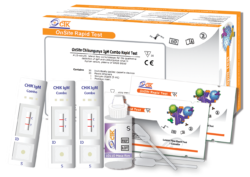Chikungunya outbreak in Sudan, December 2019
The chikungunya epidemia risk continues, such as risk communication, surveillance and lab investigations and case management.
Surveillance and vector control measures are also being implemented.
Blood samples were collected coming out favorable and 24 negative as reported by the National Public Health Laboratory of Sudan. Outcomes for 11 samples remain pending.

24 November 2019
The Federal Ministry of Health (FMoH) reported 11 new cases of CHIKV during per week 47 (17 – 23 November) of 2019. The cumulative number of reported cases this year is 177 including four related deaths with a case fatality rate of 2.2 percent. One of the reported cases, 65% were female and 69% were older. The most affected age group was people between 15 and 29.9 years who accounted for 37 percent of all situations. Currently, six states are currently reporting Chikungunya cases, specifically South Darfur, West Darfur, East Darfur, Kassala, Sennar and White Nile. The most affected one of these are West Darfur (131 cases) and South Darfur (23 instances ).
Among the whole number of cases, 86% complained of fever. Other frequent symptoms involved joint pain followed by annoyance (78% and 62% respectively). Only 6 percent had bleeding.
The CTK CHIKV IgM rapid Evaluations were assessed at CDC with a board of serum specimens which had formerly been submitted to and tested at the CDC arbovirus diagnostic laboratory ,
To investigate if the drop in performance was due to batch variability of the CTK kit, 30 CHIKV-A226 IgM positive and 10 CHIKV negative samples in the first outbreak were retested with the second batch of CTK kits.
Not one of the CDC CHIKV IgM+ samples, including the CDC CHIKV IHPC, tested in two repeats, had a favorable result
100 formerly confirmed CHIKV IgM+ Topical serum samples, 99 diagnostic samples determined to be CHIK IgM− but harboring pathogen-specific antibodies (IgM or IgG) against a number of other human pathogens, and 48 clinical trials that had been shown to be CHIKV IgM− and without a recorded positive serological results for other infectious agents,
Of the 100 confirmed CHIKV IgM serum samples that are +, 63 were gathered from cases with travel history of CHIK and other regions in the Americas; 2 each had a travel history to Asia, Africa, and Oceania.
To examine sensitivities of the kits, one CDC CHIKV IHPC and six CDC CHIKV IgM+ samples were diluted 2-fold into 1:12,800 in sample dilution buffer and tested.
info@ahfad.org